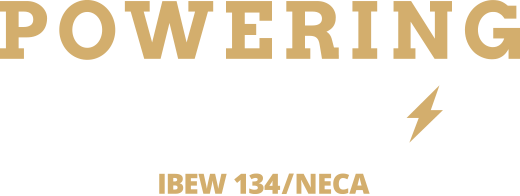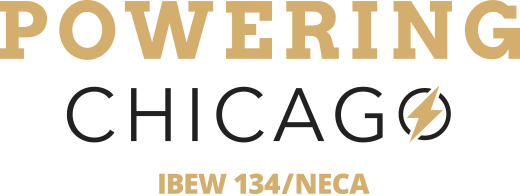National Apprenticeship Week 2021: A Conversation with Third-Year Apprentice Amy Price
- Posted: November 18, 2021
- National Apprenticeship Week 2021
Powering Chicago celebrates our amazing apprentices during the 7th annual National Apprenticeship Week (NAW), November 15 – 21, 2021. With over 1,500 apprentices trained at our IBEW-NECA Technical Institute, we are proud of the hard work of all our students.
NAW is a nationwide celebration where industry, labor, equity, workforce, education, and government leaders host events to showcase the successes and value of Registered Apprenticeship for rebuilding our economy, advancing racial and gender equity, and supporting underserved communities.
We know the path to IN-Tech is not always a direct one. Some apprentices heard about us from friends or family in the union or were looking for the next step after serving in the military. All are motivated by the desire to have a good job with security, learn a skill where they can succeed, and be part of a brother and sisterhood that remains for life.
As part of our celebration, we’ll be sharing our apprentices’ stories.
Here is our conversation with third-year apprentice Amy Price.
Why did you decide to become a union electrician?
Amy: Being a member of a union has been one of my goals in life for a while. I wanted to find a union where I would also enjoy the career and be able to actually make a 30 year go of it. I’ve been interested in the building trades for a long time, specifically the IBEW. I did my research and decided it was something that I would like to do for work and which would also have good opportunities for me to get involved in the union.
I like working with my hands.
Tell me a little bit about your experience at IN-Tech and how it’s preparing you for a career in electrical construction.
Amy: I think in the years from school to in the field, you get exposed to a lot of things at IN-Tech that you won’t see every day in the field.
I think especially in the first year, you have some sense of what you’re doing or how everything fits together, but not a complete understanding of why. We’ve learned a lot of that in my third year. In addition, we are building on all the basic stuff that we’ve learned from first and second year. Coming back into the classroom, we have an opportunity to ask questions and actually get to understand things in a more in-depth way.
What are some of the innovative ways that you feel like you’re experiencing this profession?
Amy: I think our first year we learned a lot of the basics like this is a circuit and here’s how this very basic thing works. You had this principle that you take into second year, into motor controls. Now, in third year, we are learning about transformers and everything that we thought we knew in some of these other classes. You realize there is this whole universe of stuff to learn and the topic goes so much deeper than you initially thought it did.
You’re getting exposed to more specific applications and complex applications of the work that we do and the principles that we learned early on. It gives you a foundation to understand any of those new things that are happening in the industry.
How has IN-Tech had an effect on your life?
Amy: The thing I like the most about this school is that in addition to having a good curriculum and a pretty solid program that adequately prepares you for succeeding in your career, at its heart is a bunch of people who are from the industry who have been in your shoes, who are now running the school, teaching and helping you get to wherever you want to go next. Whether it’s working in the field for the rest of your life or being a part of the union, there’s a lot of ways you can go. As part of IBEW, one of the most important things that you learn here is how to be a member of something that’s larger than just yourself and your own personal goals – how to be a team player, how to be a member of a union, how to work as a team.
I’ve also learned that if people fall behind, someone is there helping them understand the work and understand. It’s not just about you and what you can do. It’s about what all of you can do together.
Tell me about your experience with the Four Lenses and the DEI training.
Amy: I thought the Four Lenses training was both a lot of fun and really interesting. I got really into the personality typing systems just in general, and I liked having an opportunity to sit down with my classmates. I think a lot of us don’t get the opportunity to actually sit and think about how we think about ourselves and our relationships. And what that means for the way that we interact with the world and the way that we’re interpreting other people’s interactions with us.
It’s really nice to get just a day to sit down and hash through it. Everyone I talked to really enjoyed it, even some of the people that were feeling a little bit skeptical about it. It was a really fun day, because of just getting to do small group exercises where I got to talk to people in this program I’ve been in school with for three years that I didn’t know. I realized I had things in common with them based on our outlooks and perspectives.
There was a lot of time for prioritizing, thinking about how we treat other people and reflecting on how we’re going to use that to build a better union, a better organization, and how to be better people at our jobs and in our personal lives.
How will it help you when you’re out in the field?
Amy: For me, more than anything, the value comes in understanding yourself a little bit better and being able to catch yourself when you’re reacting instead of stopping and choosing how you act.
Doing this in a larger group setting gives you an opportunity to talk with your peers, and think through these things, in more of a social sense instead of just how it relates to you personally. I was able to compare and contrast my ways of being and existing with people who are wildly different from me. It helps you reduce blind spots when you’re in the world outside of class or the lecture.
How has IN-Tech prepared you to work in renewable energies like solar?
Amy: With the solar photovoltaics class we had in second year, we got to practice building a couple of different systems and understanding how all of the different components fit together. We learned ways that you can set up the systems and how they integrate with existing electrical systems. Having the exposure to all of that is great, so when you go out in the field and see something, it’s not for the first time. You’re going to be able to be an asset to your team.
National Apprenticeship Week is an opportunity to highlight how Registered Apprenticeship, a proven and industry-driven training model, provides a critical talent pipeline that can help to address some of our nation’s pressing workforce challenges such as responding to critical supply chain demands and supporting a clean energy workforce, modernizing our cybersecurity response, addressing public health issues, and rebuilding our country’s infrastructure.

